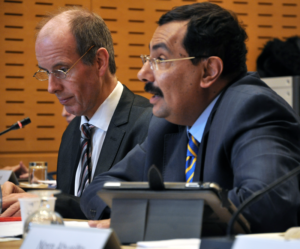
Commission meeting sets forth digital economy 2013 work plan
The economic growth and societal opportunities effectuated by the Internet and other information and communication technologies (ICTs) bring new responsibilities that require the global cooperation of all stakeholders.

The message was given by Tarek Kamel, Senior Advisor to the President and CEO of The Internet Corporation for Assigned Names and Numbers (ICANN), while speaking as a guest at the opening 2013 meeting of the ICC Commission on the Digital Economy. Mr Kamel was joined by colleagues Nora Abusitta, Executive Director of Intergovernmental Organization and International Organization Stakeholder Engagement, and Nigel Hickson, Vice President of ICANN Europe, to exchange views with the commission members, who converged in Paris last week to discuss strategy and priorities for 2013.
The ICC Commission on the Digital Economy provides a forum for members to share insights on timely developments in the ICT field, and in turn, establish global consensus policy positions on behalf of the business community to help foster the sustainable growth of the ICT sector. Led by commission Chairman Herbert Heitmann, Executive Vice President, External Communications, Royal Dutch Shell, the meeting featured discussions on a range of issues relating to the commission’s 2013 work programme, including a debrief on the World Conference on International Telecommunications (WCIT) which took place in Dubai, United Arab Emirates, from 3-14 December 2012. The WCIT conference resulted in some divided views between the 144 participating countries, with 89 signing the treaty and 55 leaving Dubai without signing the treaty. One priority for the ICC Commission on the Digital Economy in 2013 will be to promote ways for continuing global cooperation on policies that will promote the availability and adoption of international telecommunications services, based on the experiences of the business community as well as what this community has heard and learned from other stakeholders in government and civil society.
Attesting that the WCIT had witnessed a divide on how different countries view the policy environment for the future of telecoms, Mr Kamel called on the ICC commission to engage business constituencies worldwide in constructive dialogues and partnerships and to build trust at regional and global levels. “You have a responsibility to bring the voice of business to the table,” he said urging businesses to help take ICANN messages to business communities in both developing and developed economies. Responding to the call for cooperation, commission members said that they were encouraged by the clear signs that business was being listened to at ICANN on issues such as the implementation of generic top-level domain names (gTLDs).
During the meeting, commission members also highlighted the importance of the continued success of the annual Internet Governance Forum, given its effective role as a multistakeholder forum for advancing the most important Internet policy matters of the day.
The two-day commission meeting brought together members and guests from 14 countries, including new members from Mexico and the US. The meeting also featured extensive discussions on the role of a private-sector led multistakeholder Internet, on the impact of ICTs for job creation and economic growth, on the protection of personal data and privacy, and on paperless trade facilitation. The commission also discussed business messages relating to Internet governance policy and discussed ways in which to make the tools of the commission more accessible and usable to the non-technical community particularly in developing countries.
The meeting concluded with an agreement to prepare a comprehensive ICC paper that will provide guidance on the most important current policy positions and multistakeholder resources for promoting growth of the digital economy.
For more information on the commission’s work please visit the ICC Commission on the Digital Economy.

